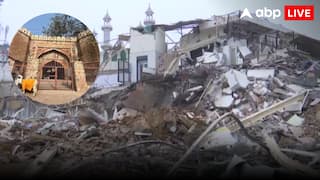AC Set At 27C, Work From Home, Lights Out At 10pm: How EU Nations Are Fighting Energy Crisis Amid Heatwave, Ukraine War
Europe is experiencing a power shortage amid the Russia-Ukraine war as it is unable to increase its energy production, and the current heatwave has only worsened the crisis.

Spanish Prime Minister Pedro Sanchez recently urged people to ditch their neckties, in order to feel comfortable and to be able to depend less on air-conditioners. "This means that we can all save energy," AFP quoted him as saying.
Amid the Russian-Ukraine war, high prices, supply cuts and global heatwave, the energy crisis in Europe is deepening with each passing day. Until a couple of months ago, the European countries were planning to reduce their reliance on Moscow, to save energy for the coming winter. But what was not part of the plan was the heatwave challenge ahead of them. The European climate is not supposed to witness weather of 40 degrees Celsius, and hence an unprepared Europe is now facing numerous challenges to meet its energy needs.
Is Europe Opting For Greener Alternatives?
The sudden increase in power needs due to the heatwave across Europe has caused a kind of restlessness in European nations to secure their power needs and ensure enough power supplies in their respective nations. The measures are taken to ensure these supplies seem less green and sustainable in nature, though.
Energy experts claim that a severe heatwave, lack of hydropower, and corrosion issues at French nuclear reactors are worsening the continent's catastrophic energy position. Concerns about further supply disruptions of essential commodities have also been sparked by low water levels on the Rhine, a river that is an important shipping route in Europe. Governments and businesses have been frantically searching for supply solutions that involve more fossil fuels, not less, Washington Post reports.
Europe is definitely in a power crisis as it is helpless to rise its energy production due to a lack of natural resources, gas-run stations and nuclear power plants are unable to make ends meet, and the prevailing heatwave across the UK and Europe only exacerbating the energy crises due to increased demand.
Why EU Wants To Reduce Dependency On Russian Gas
The Russia-Ukraine war has been raging for months. The international community responded to the Russian invasion by implementing numerous sanctions and banning Russia from participating in all significant international gatherings. In response, Russia decided to cut down the supply of natural gas and oil to the West, especially in Europe.
Now, it is an established fact that Europe is heavily dependent on Russian gas to meet its energy needs. According to the International Energy Agency (IEA), Europe’s reliance on natural gas imported from Russia was thrown into sharp relief after Russia invaded Ukraine in February this year. In 2021, the European Union imported an average of over 380 million cubic metres (mcm) per day of gas through pipeline from Russia or around 140 billion cubic metres (bcm) for the whole year. Besides, around 15 bcm was delivered in the form of liquefied natural gas (LNG). The total 155 bcm imported from Russia accounted for around 45% of the EU’s gas total imports in 2021, and almost 40% of its total gas consumption.
The EU has now come up with a detailed plan to reduce energy dependence on volatile fossil fuels and what it calls "unreliable suppliers". It has named the plan, REPowerEU.
What Is REPowerEU?
REPowerEU is a proposed outline of a plan to make Europe independent from fossil fuels well before 2030, starting with gas, in the wake of the Russian invasion of Ukraine.
This plan also outlines a series of measures to respond to rising energy prices in Europe and replenish gas stocks for next winter. REPowerEU will seek to diversify gas supplies, speed up the rollout of renewable gases and replace gas in heating and power generation. With this, the EU can reduce its demand for Russian gas by two-thirds this year.
How EU Plans To Reduce Dependency On Russian Gas
As per a report by the IEA, the European Union can achieve its aim to reduce dependency on Russian Gas by implementing the following measures:
- No More Agreements Or Contracts With Russia On Gas Supply
- Identify And Rely On Non-Russian Sources
- Introduction Of Minimum Gas Storage Obligations To Enhance Market Resilience
- Accelerating The Deployments Of New Wind And Solar Projects
- Reliance On Existing Sources; Nuclear And Bioenergy
- Enact Short-Term Measures To Shelter Vulnerable Electricity Consumers From High Prices
- Accelerate Energy Efficiency Improvements In Buildings And Industries
Measures Being Taken By EU Nations
Spain: On Monday, Spain became the latest European country to seek to cut energy use and dependence on Russian oil and gas. Giving seven days to comply with a set of new measures, it announced that public buildings, cinemas, shopping centres, railway stations and airports should not set heating above 19 degrees and air conditioning below 27 degrees. People have been asked to keep doors shut to avoid wasting energy and switch off lights in shop windows after 10 pm. Other measures include more work from home, besides inspections of hot water and central heating boilers not done after January 2021, and of buildings that were last checked for energy efficiency before January 2021, according to reports.
France: Shops with AC have been told to keep their doors shut, and non-compliance could invite a penalty of €750 (Rs 60,000 approx.), according to reports. Illuminated signs are to be switched off “as soon as the store closes”, The Guardian reported. Illuminated advertising also stands banned between 1 am and 6 am, except at railway stations and airports. Public areas will have thermostats set lower in winter and higher in summer.
Germany: Spotlights on public monuments are being switched off, and fountains turned off. Sports centres and public pools are offering only cold showers. The city of Hanover has gone a step ahead and decided that municipal buildings will only be heated from October to March and at no more than 20C room temperature, and ban the use of mobile AC units and fan heaters.
Italy: Last month, responding to Russia’s curtailment of the shipment of gas, the country said it is pulling ahead to reduce its dependency on Moscow. The country has cut its reliance on Russian gas imports to 25%, from about 40% at the start of the year, Bloomberg reports. Italy's emergency plan, though not introduced yet, calls for lights to be switched off around monuments, and the closure of commercial activities at 7 pm. Since May, public buildings other than hospitals in Italy have been told to prevent AC units from running above 19C in winter and below 27C in summer.
Ireland: People have been urged to consume less energy at home, and also reduce vehicle speed limits to cut petrol use. Households have been advised to set the thermostat at 20 degrees Celsius in living areas, and 15-18 degrees in hallways and bedrooms in summer, and judiciously use dishwashers and washing machines. The power department even advised people to not "fill the kettle" full to make one cup of coffee, according to the Guardian report.
Greece: Highly dependent on the gas from Russia, the country introduced “operation thermostat” in June aiming to reduce energy consumption by 10% this year, and 30% by 2030. Measures also include AC running not below 27 degrees in summer, and installation of window shields in public buildings. People have been urged to ensure computers are switched off after working hours.





































